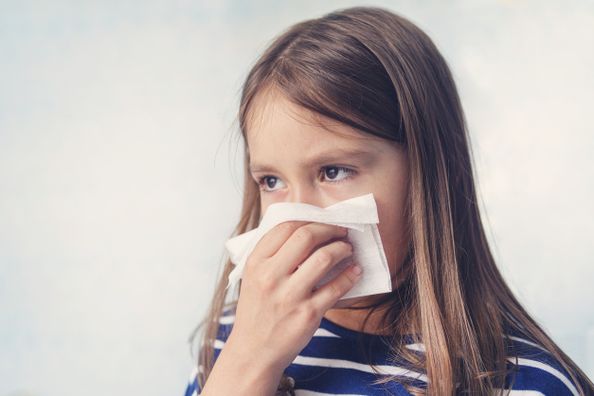As temperatures drop and seasons change, it’s not uncommon to develop symptoms such as nasal congestion, sneezing, itchy eyes, coughing, facial pressure and body aches. You may shrug off these symptoms as nothing more than a head cold, but they may be caused by seasonal allergies or a sinus infection which may require different treatments to resolve. To help you determine what’s behind your symptoms, board-certified otolaryngologist (ENT), Feodor Ung, MD, shares differences between colds, allergies and sinus infections and how you can get symptom relief.
Spotting the Difference
While they share many of the same symptoms, the duration, severity and the underlying causes of colds, allergies and sinus infections can be quite different.
Common colds develop due to an upper-respiratory infection caused by viruses and bacteria that are transmitted through the air or by direct contact with a contaminated surface or an infected individual.
Environmental allergies are caused by an allergic reaction to specific substances or allergens like pollen, mold, dust or animal dander.
Sinus infections develop when the tissue lining your sinus cavity becomes inflamed after exposure to bacteria, viruses or fungi. In some cases, during a cold or allergy flare-up, your sinus cavity is unable to drain properly. This causes symptoms to linger longer than normal. It can cause increased inflammation and bacterial build-up, which eventually leads to a sinus infection.
In addition to their different causes, each condition also has differences in their symptoms including:
Colds | Seasonal Allergies | Sinus Infections | |
Aches | Mild head and/or body aches | Headaches and less commonly, body aches | A headache that may worsen over time |
Cough and/or sore throat | Common | Occasionally | Common, and may be accompanied by bad breath, due to sinuses draining into the throat |
Nasal congestion and sneezing | Common | Common, often multiple sneezes in a row | Common |
Eye discomfort | Rare | Common | Common, described as pressure and/or pain around the forehead, eyes and cheeks |
Fatigue | Occasional | Occasional | Occasional |
Fever | Common | Never | Occasional |
Mucus type | Can vary from clear to green, yellow and thick | Most often thin, clear | Usually green or yellow and thick, often lasting longer than 10 days |
Symptom onset | Sudden onset of symptoms | Varies by person, in some, symptoms gradually worsen, while in others symptoms appear suddenly | Symptoms may initially seem to improve and then worsen significantly |
Time of year | More common in winter | More common during the spring and fall | Can develop year-round but can increase during cold, flu and allergy seasons |
Duration | Typically resolves on its own within 10 days | Symptoms generally improve quickly after reducing or eliminating your exposure to the allergen (staying indoors and keeping windows closed) | Symptoms can last several weeks and in some cases, more than a month and often require antibiotics |
Treatment for each condition also varies slightly. In most cases, colds can be managed with over-the-counter medications such as Tylenol and Motrin (for head and body aches), antihistamines, decongestants, saline irrigations and nasal sprays (for nasal congestion) and cough suppressants. In addition to medications, drinking plenty of fluids and resting will help you recover from a cold.
Allergies, depending on the severity, may be treated with over-the-counter or prescription-strength antihistamines, nasal sprays or eye drops. Limit your exposure to allergens in your home with HEPA air filters, allergen-proof pillow and mattress covers, keeping windows and doors shut when pollen counts are high and changing your clothes after spending time outdoors. If you experience frequent or severe allergy symptoms, your doctor may recommend immunotherapy (allergy shots) to help build up your immune system and tolerance to certain allergens.
Sinus infection treatments aim to reduce inflammation by opening your airways and eliminating the infection. Your physician may recommend several therapies to help manage your symptoms and clear your infection, including:
- Nasal sprays and/or oral decongestants (to open up nasal passages and allow your sinuses to drain)
- Nasal saline washes (which help clear thick mucus from your nasal passage)
- Antihistamines (to reduce inflammation)
- Pain relievers (like Tylenol or Motrin)
- Nasal corticosteroids (prescription-strength nasal sprays that prevent and reduce inflammation in your sinuses)
- Antibiotics (which target the bacteria causing the infection)
- Oral steroids
When other treatment methods don’t completely clear the infection or for those who experience chronic sinus infections, surgical treatment may be recommended. Sinus infections are considered to be chronic when they occur four or more times a year or when symptoms persist for more than three months.
As we head into cold and flu season, it’s important to understand the differences between colds, allergies and sinus infections so that you can select treatment options that will give you the fastest relief.
We know that it can be difficult to diagnose an illness on your own. That’s why our team of primary care and specialty physicians is here to help you evaluate and treat any ailment that may arise, to help you stay healthy throughout the year.
For help managing your symptoms, schedule an appointment with one of our physicians at dulyhealthandcare.com/online-schedule/.
Health Topics:







